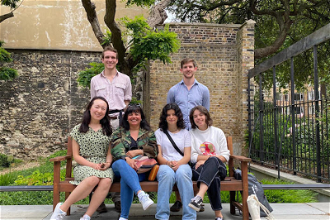Viewpoint: Lectio Divina is for everyone

Edward Kendall
During lockdown I have really grown in my devotion to reading Scripture, utilizing an ancient method of praying with the Scriptures known as Lectio Divina.
So, what is Lectio Divina? Pope Francis defines Lectio Divina as "reading God's Word in a moment of prayer and allowing it to enlighten and renew us" (Evangelii Gaudium, 2014). In other words, it is a means of reading the Scriptures in a way that changes our lives because Scripture, being the Word of God, has that capability. Pope Francis, addressing a delegation from the American Bible Society in 2018, said that "praying with the Scriptures, you will be able to experience anew the effectiveness of that word: it does not return empty but accomplishes the purpose for which it was given (cf. Is 55:10-11)."
Pope Francis is building upon a body of Papal teaching on the subject. For instance, Pope John Paul II writes in his encyclical Novo Millenio Inneunte (2001) that it is "especially necessary that listening to the word of God should become a life-giving encounter, in the ancient and ever valid tradition of Lectio Divina, which draws from the biblical text the living word which questions, directs and shapes our lives." That same saintly Pope, in his apostolic exhortation Ecclesia in America (1999), described Lectio Divina as a "practice to be encouraged among all Christians" and that for priests it must be a "basic feature of the preparation of their homilies, especially the Sunday homily." I am part of a group who regularly practice Lectio Divina and there are at least two priests who are regular attendees. As if to prove the efficacy of Pope John Paul II's advice at least one of the priests in the group has told me that the personal insights we share among ourselves as fruits of our Lectio Divina have helped to inform his homilies.
Pope emeritus Benedict XVI is a big fan of Lectio Divina too, arguing that if effectively promoted "this practice will bring to the Church - I am convinced of it - a new spiritual springtime." No doubt this conviction was the reason why, speaking at the inaugural session of the 2007 Aperecida Conference, he urged the Bishops to "train people to read and meditate on the word of God." He stressed that this must become "their staple diet, so that, through their own experience, the faithful will see that the words of Jesus are spirit and life (cf. Jn 6:63)." Benedict XVI is well-known for pointing out the short-comings of the historical-critical method of reading and interpreting Scripture, insofar as it focuses exclusively on the human origins of the Biblical text and pays no attention to its Divine authorship. It is perhaps not surprising, therefore, that the Pope emeritus would be such a keen advocate of Lectio Divina. This is because it is a method of reading Scripture premised on the fact that the Scriptures are the inspired Word of God and therefore can and should speak to us in our daily contemporary lives.
Just in case these Papal endorsements of Lectio Divina are not enough to convince you, the Church has considered it to be so important to the spiritual life that it has seen fit to grant a plenary indulgence, subject to the usual conditions, to those of the faithful who spend at least one half-hour engaged in the practice (Enchiridion Indulgentiarum, no. 50).
So now that we have defined Lectio Divina and dwelt a little on the benefits of putting it into practice, let us move on to its methodology. The methodology is very simple and effectively consists of reading the passage and then meditating upon it. To help us meditate, Pope Francis, in his encyclical Evangelii Gaudium (2014), suggests prayerfully asking some of the following questions upon reading our chosen passage:
"Lord, what does this text say to me?"
"What is it about my life that you want to change by this text?"
"What troubles me about this text?"
"Why am I not interested in this?"
"What do I find pleasant in this text?"
"What is it about this word that moves me?"
"What attracts me? Why does it attract me?"
It will probably strike you how personal and intimate these questions are, and how far removed they are from the sorts of questions one might associate with usual Biblical study or discussion. But this is because our faith is ultimately built upon a personal relationship with Jesus Christ, whereby our heart communes with that of God. Remember the motto of St John Henry Newman: cor ad cor loquitor, heart speaks to heart. Lectio Divina is a means, along with the sacraments, by which we can foster that heart-to-heart relationship.
All that has been said by the Church Fathers and the magisterium on Lectio Divina has supposed the practice to be an individual one and for me this is normative. However, it is now increasingly common for Lectio Divina to be practised in a group setting and in an age of increasing loneliness and isolation there is much to be said for like-minded Catholics coming together to practise Lectio Divina communally. Indeed, great spiritual friendships have been created and nurtured from like-minded people coming together for communal prayer centred around the Word of God, and then sharing with each other how the passage read has challenged or consoled you (perhaps having considered the questions proposed by Pope Francis above). However, sharing personal insights in this way can also be daunting for some people and it is by no means obligatory to share a reflection within a Lectio group or indeed to practice Lectio Divina within a group setting at all.
In this country there are a network of Lectio Divina groups which are collectively known as the Weave of Manquehue. They have a Benedictine charism and every year run workshops on how to practice Lectio Divina or start a Lectio group. If you are interested in joining a Lectio group near you or starting your own they will be able to help you.
Even if you eventually decide that Lectio Divina in a group setting is not for you, it is nevertheless a wonderful way to be introduced to the practice in a supportive environment and once learned it can then be brought into one's own individual prayer life with what I hope will be transformative effects.


















